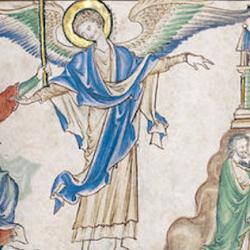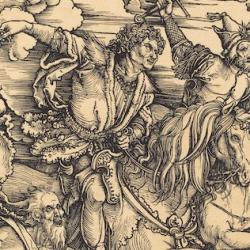The Greek doulos is used twice in the first verse of Revelation, first of the recipients of the apocalypse and then of John himself. The translation “bond-servant” is one of the leftovers of KJV, which tended to assimilate the social structure of the Bible to the social structure of seventeenth-century England. It’s better translated as “slave,” and it is one of the common designations for the members of the community of Christ throughout the book. Revelation speaks a few times of those who “follow” Jesus (14:4; 19:14), but never of “disciples” or “believers.” The word “saint” appears 13x.
The word “slave” is used 14x in Revelation. In a few cases, it occurs in passages where John is describing a judgment on all social classes, both “slave and free” (6:15; 19:18), or the fact that people from all social classes receive a mark from the beast (13:16). In a few passages, the prophets of Jesus are specifically said to be His slaves (10:7; 11:18), and once Moses is called a slave of God (15:3). John is a slave of God or of Christ (1:1). In the seven other instances, “slave” is the designation of followers of Jesus, sometimes in the phrase “slaves of our God.” They are the ones who have been marked with a protecting mark on the forehead, those who shed their blood in serving Jesus, those who fear God, and those who serve Him (1:1; 2:20; 7:3; 19:2, 5; 22:3, 6).
Christians are slaves of God, but in Revelation these slaves are being treated as “friends” of the King. Slaves don’t know what their master is doing. But to the slaves in Revelation Jesus unveils things that must shortly take place.










